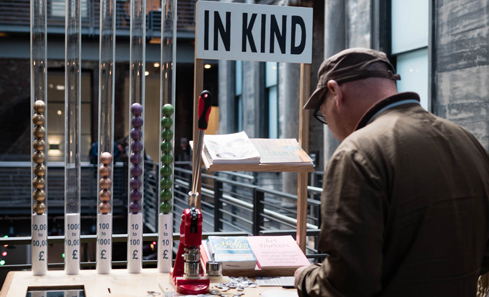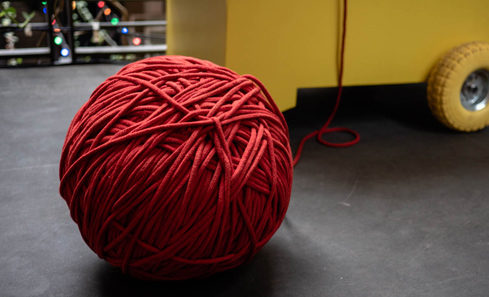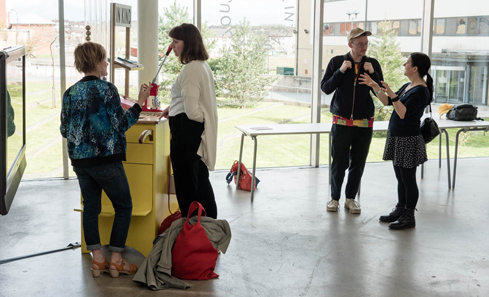
In Kind is a research project by artists Janie Nicoll and Ailie Rutherford, charting the hidden economies of the visual arts using Glasgow International 2018 as a case study. As the final event approaches, we spoke to them about how it's going so far.
In Kind evolved from a dialogue between the two of us on the economy of the arts. This collaboration brings together Ailie's previous work on alternative currencies and "below the water line" economies with Janie's experience as president of Scottish Artists Union, campaigning for fair pay for artists. The In Kind project was informed by our conversations with previous participants of GI, where it has become increasingly apparent that the festival’s ‘in kind’ economy is the elephant in the room for many artists and projects in GI, while also being endemic within the art scene in general.
The notion of the economy “below the water-line” is taken from the metaphor of The Economy As An Iceberg, by feminist economists JK Gibson-Graham, as a means of describing the diverse economic practices and unseen labour in our economy.
We are aiming to uncover the unpaid work of artists that underpins the apparently successful arts festival model- Ailie Rutherford and Janie Nicoll
As artists based in Glasgow we decided to take GI as a case study, using the festival itself as a platform to excavate the extent of this underlying economy, to not only highlight the issues, the precarious and unsustainable nature of these large-scale events, but also aim to empower artists and organisations alike to make the case for proper remuneration for their labour, time and efforts, and to begin to sketch out possible alternative models.
In a wider context we are aiming to uncover the unpaid work of artists that underpins the apparently successful arts festival model rolled out across major cities, looking at whether this is actually a sustainable model for artists and the sector in general. Alongside our Information kiosk we are also hosting a series of events to open up the debate on artists’ precarity and how this affects the lack of diversity in the arts in Scotland.
Artists participating in GI can log their unpaid labour and any financial costs via the Information kiosk. Visitors to GI can then see in visual form representations of the amount of unpaid labour that supports this festival. We are representing this via digital data visualisations along with more analogue displays such as a ping-pong ball abacus counting the total cost to artists in terms of their labour and financial costs, and a giant ball of string where every hour worked unpaid on GI is represented by 1cm of red rope.

The statistic that has really shocked people this week was when the estimated cost to artists totalled £1.6million. This is the same amount of money GI is estimated to bring in to the city of Glasgow and yet none of this trickles back down to the artists making the work. It shows very clearly that we need a new economic model.
The recurring theme through these events has been the disproportionately negative effect this culture of unpaid labour has on anyone who is not male, white, cis gendered, affluent, able-bodied and free from caring responsibilities.

The idea with the soapbox event is that people can come along and have their say on the state of the arts - this might be artists who have been working on GI this year or in previous years, or people who want to talk about the broader issues of unpaid labour and the lack of diversity in the Scottish art scene.
For anyone feeling like they want to have a say but don't fancy talking through the megaphone, they can send comments in via our website or on Twitter using hashtag #INKIND.
We intend to pull some of the key findings together in a publication later this year, accompanied by an exhibition and further events - GI have already said that this research will impact on how they run the festival in the future.
In Kind Soapbox is on Sunday 6 May at Kings Court in Glasgow, from 5.30 – 6.30pm. It will be an open event for artists and participants of GI2018, and anyone else who’s interested, to have their say, make a provocation or a statement about the state of the arts. You can follow the project's progress at inkindproject.info.
In Kind received National Lottery funding through Creative Scotland's Open Project Fund.